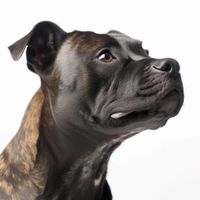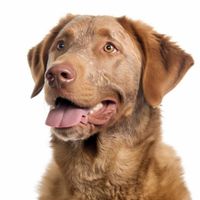Staffordshire Bull Terrier - vs - Australian Shepherd - vs - Chesapeake Bay Retriever
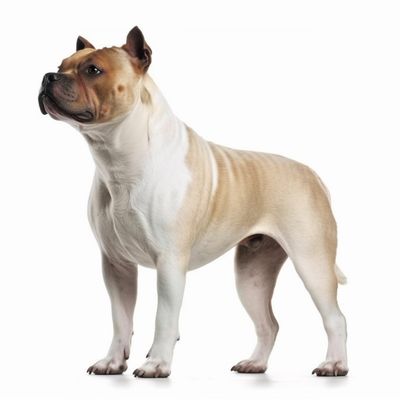
Staffordshire Bull Terriers are medium-sized dogs, weighing 24-38 lbs, with a height of 14-16 inches.
Staffordshire Bull Terriers have a high energy level and enjoy an active lifestyle.
Staffordshire Bull Terriers need regular exercise, including daily walks, play sessions, and mental stimulation, to stay happy and healthy.
Staffordshire Bull Terriers are intelligent and trainable, but can be stubborn. Consistent, positive reinforcement is key.
Staffordshire Bull Terriers are intelligent dogs and can excel in various dog sports and activities, such as agility and obedience.
Staffordshire Bull Terriers can adapt to various living situations, including apartments and larger homes, as long as their exercise needs are met.
Staffordshire Bull Terriers are known to be good with children, as they are affectionate, patient, and tolerant.
Staffordshire Bull Terriers can get along with other pets, but early socialization and proper training are essential.
Staffordshire Bull Terriers can tolerate colder temperatures, but their short coats require proper protection during extreme cold.
Staffordshire Bull Terriers can tolerate hot climates but need to be monitored for signs of overheating during exercise.
Staffordshire Bull Terriers have a short coat and shed minimally, making grooming relatively easy.
Staffordshire Bull Terriers require minimal grooming, including occasional brushing and bathing to keep their coats clean and healthy.
Staffordshire Bull Terriers have average bark tendencies and may bark for various reasons, such as alerting their owners or during playtime.
Staffordshire Bull Terriers are generally healthy, but regular veterinary checkups and preventative care are still necessary.
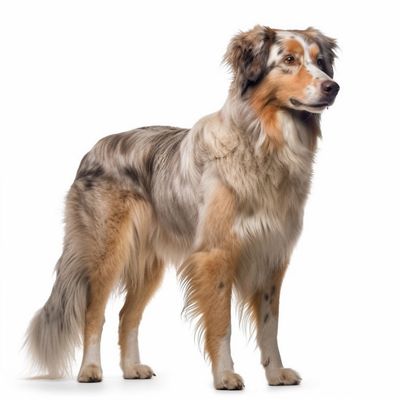
Australian Shepherds are medium-sized dogs, standing 18-23 inches tall and weighing 40-65 lbs.
Australian Shepherds have high energy levels, requiring plenty of exercise and mental stimulation.
Australian Shepherds need lots of daily exercise, including walks, runs, and activities like agility, herding, or obedience training.
Australian Shepherds are intelligent and eager to learn, making them highly trainable with positive reinforcement and consistent training.
Australian Shepherds are highly intelligent and excel at problem-solving and learning new tasks.
Australian Shepherds are adaptable but thrive best in an active household with space to exercise and work.
Australian Shepherds can be good with children, especially when properly socialized and supervised.
Australian Shepherds generally get along well with other pets when properly socialized, although their herding instincts may cause them to chase or herd smaller animals.
Australian Shepherds have a double coat that provides insulation, allowing them to handle colder climates well.
Australian Shepherds can tolerate heat, but they should be provided with shade, water, and limited exercise during the hottest parts of the day.
Australian Shepherds have a double coat that sheds seasonally, requiring regular grooming to remove dead hair.
Australian Shepherds require regular grooming, including brushing at least once a week and more frequently during shedding seasons.
Australian Shepherds have average bark tendencies and may bark for various reasons, such as alerting their owners or during playtime.
Australian Shepherds may experience some health issues and require additional care and attention, such as regular veterinary checkups, preventative care, and potential medication or treatments.
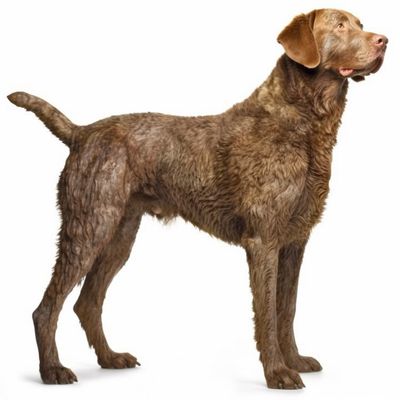
Chesapeake Bay Retrievers are large dogs, weighing 55-80 lbs, with a height of 21-26 inches.
Chesapeake Bay Retrievers have a high energy level and require regular exercise and mental stimulation.
Chesapeake Bay Retrievers need a significant amount of exercise, including daily walks, runs, and opportunities to swim or retrieve.
Chesapeake Bay Retrievers are intelligent and trainable, but can be stubborn. Consistent, positive reinforcement is essential.
Chesapeake Bay Retrievers are highly intelligent dogs and excel in various dog sports and activities, especially those involving water.
Chesapeake Bay Retrievers can adapt to different living situations, but they need plenty of space and exercise to thrive.
Chesapeake Bay Retrievers are good with children when properly socialized and supervised.
Chesapeake Bay Retrievers can get along well with other pets, especially when raised together.
Chesapeake Bay Retrievers are well-suited for cold climates, thanks to their dense, water-resistant coats.
Chesapeake Bay Retrievers can tolerate hot climates but need to be monitored for signs of overheating during exercise.
Chesapeake Bay Retrievers have a dense coat that sheds moderately, requiring regular brushing to minimize shedding.
Chesapeake Bay Retrievers require regular grooming, including brushing and occasional bathing to keep their coats clean and healthy.
Chesapeake Bay Retrievers bark occasionally, usually only when necessary or provoked.
Chesapeake Bay Retrievers are generally healthy, but regular veterinary checkups and preventative care are still necessary.

